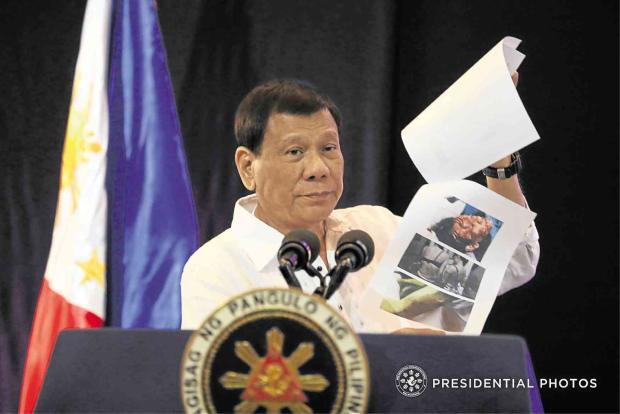
An irate President Rodrigo Duterte shows photos of Filipino workers who were reportedly abused in Kuwait during his speech at the Marco Polo Hotel in Davao City on Friday, Feb. 9, 2018. (Photo from Malacañang)
Published: 6:19 p.m., Feb. 10, 2018 | Updated: 11:04 p.m., Feb. 10, 2018
The first batch of distressed Filipinos from Kuwait are expected to start returning home on Sunday, ahead of the announcement of a ban on the deployment of household workers to the oil-rich kingdom, officials said on Saturday.
The Department of Foreign Affairs (DFA) said some 800 Filipinos, mostly household workers, were expected to arrive from Kuwait over the next few days.
Undersecretary Sarah Lou Arriola said the first batch of workers were to arrive from Feb. 11 to 13. The 800 are said to be among the 10,800 “undocumented” workers in Kuwait.
Arriola said there were about 260,000 overseas Filipino workers (OFWs) in Kuwait, 170,000 of whom were domestic workers.
Total ban
The Department of Labor and Employment (Dole) said it would finalize over the weekend an order banning the deployment of household workers
to Kuwait.
Labor Secretary Silvestre Bello III will meet with senior labor officials on Monday to thresh out the details of the ban, according to Dole spokesperson Raul Francia.
“Right now, there is only a suspension of the processing of new applications,” Francia said. “The actual order will be released after Secretary Bello meets with officials on Monday.”
“The order to send home distressed OFWs covers those who want to come home, or around 2,000 distressed OFWs,” he explained.
Pivot to China
Bello himself announced that the Dole was also finalizing a draft of a bilateral agreement with China on foreign workers.
Bello said in an interview over dzBB radio the accord was supposed to have been signed during the Association of Southeast Asian Nations Summit in Manila last November.
But China had asked for more time because of some restrictions in Chinese laws. Beijing, however, assured Bello that the signing would push through, Francia said.
Mr. Duterte was apparently referring to the accord when he said last month that China could serve as an alternative market for OFWs who would be repatriated from Kuwait.
Repatriation logistics
At the same time, Francia said two local carriers, Philippine Airlines and Cebu Pacific, had assured Bello of their willingness to help bring home the OFWs.
Cebu Pacific issued a statement on Saturday saying it was already coordinating with the DFA and its embassy in Kuwait on the repatriation process. It said special flights were being readied.
The DFA did not announce details of its repatriation plan, but it already has experience evacuating OFWs on a large scale. In 2014, the DFA evacuated some 12,000 Filipinos from Libya during the height of the the country’s civil war.
Demafelis case
The DFA said it would issue an official statement through former presidential spokesperson Ernesto Abella, who was named DFA undersecretary for “strategic communications” last October.
Bella, however, has yet to grant an interview with reporters.
The President’s order for the repatriation of distressed Filipinos from Kuwait came after police found the body of domestic helper Joanna Daniela Demafelis in a freezer in an abandoned apartment in Kuwait City last week.
The Demafelis family said Joanna went to Kuwait in 2014 and was planning to come home this year. Kuwaiti police said she died and was then stuffed in the freezer more than a year ago.
The DFA said Philippine Embassy officials were scheduled to meet with Kuwaiti forensics experts on Saturday to follow up the case.
Reform ‘kafala’ system
The DFA said charges had been filed against Demafelis’ Lebanese employer, Nader Assaf, and his Syrian wife. Kuwaiti authorities are searching for the couple in Lebanon.
Francia said Demafelis was among the scores of Filipinos who had suffered under Kuwait’s “kafala” (sponsorship) system.
The system requires a Kuwait employer’s consent before a worker can move to a new job prior to the end of his or her contract.
Incidents of abuse under the system have infuriated Mr. Duterte, who revealed in a media briefing in Davao City on Friday that 120 Filipino workers had died in Kuwait last year.
“When will this inhuman treatment of these Filipino workers end? Is there something wrong with your culture? Is there something wrong with your values?” he said, addressing the Kuwaitis.
Strong signal
“The government wants to send a strong message to Kuwait,” Francia said, only three days after Mr. Duterte met with Kuwaiti Ambassador Saleh Ahmad Althwaikh behind closed doors in Malacañang.
Presidential spokesperson Harry Roque said the ambassador extended an invitation for Mr. Duterte to visit Kuwait, though there was no DFA confirmation on when the trip would push through.
Bello, who was present when Mr. Duterte received Althwaikh, said that for Duterte’s ban to be lifted, Kuwait must sign a “memorandum of understanding,” which the kingdom has put in the back burner for three years.
Bello did not reveal details of the agreement but other officials said they involved reforms in the kafala system.
/atm /pdi

